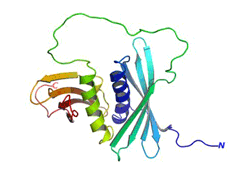
| Serial No. | GA-P0010HU |
| Species | Human |
| Specification | 0.1 mg/0.2mg |
| Brand | GenAsia |
| Origin | Shanghai |
| Price | US$350/US$620 |
Detailed information
1 Host: Escherichia coli (E. coli)
2 Species: Human
3 Protein Type: Recombinant
4 Synonyms: OncoM, OSM
5 Purity: 95% by SDS-PAGE
6 Application: WB、 Elisa、 Functional Studies
7 Background:
Oncostatin M (OSM) is an important growth regulating cytokine that affects, variably, a number of tumor and normal cells. Oncostatin M exerts inhibitory effects on the growth of A375 melanoma and other cellos, but augments the growth of normal fibroblasts, AIDs-related Kaposi sarcoma cells, and certain other cells. Recombinant Human Oncostatin M is a 26 kDa protein containing 227 amino acid residues
8 Storage&Stability:
Avoid repeated freeze and thaw cycle.Store at 2-8℃ for delivery and store at -20 or -70℃ for future use. The loss rate of the target protein which describes the stability was determined by accelerated thermal degradation test.That is to incubate the protein at 37℃ for 48h and no obvious degradation and precipitation were observed.The loss of this protein is less than 5% within the expiration date under appropriate storage condition.
2 Species: Human
3 Protein Type: Recombinant
4 Synonyms: OncoM, OSM
5 Purity: 95% by SDS-PAGE
6 Application: WB、 Elisa、 Functional Studies
7 Background:
Oncostatin M (OSM) is an important growth regulating cytokine that affects, variably, a number of tumor and normal cells. Oncostatin M exerts inhibitory effects on the growth of A375 melanoma and other cellos, but augments the growth of normal fibroblasts, AIDs-related Kaposi sarcoma cells, and certain other cells. Recombinant Human Oncostatin M is a 26 kDa protein containing 227 amino acid residues
8 Storage&Stability:
Avoid repeated freeze and thaw cycle.Store at 2-8℃ for delivery and store at -20 or -70℃ for future use. The loss rate of the target protein which describes the stability was determined by accelerated thermal degradation test.That is to incubate the protein at 37℃ for 48h and no obvious degradation and precipitation were observed.The loss of this protein is less than 5% within the expiration date under appropriate storage condition.








